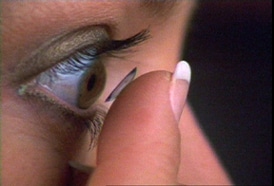Keratoconus, often referred to as “KC” is an eye disease that causes the cornea to become progressively thinner. A normal cornea is round or spherical in shape, but with keratoconus the cornea bulges forward, assuming more of a cone shape. As light enters the cone shaped cornea it is bent and distorted and unable to come to a point of clear focus on the light-sensitive retina.
Keratoconus usually affects both eyes but the two eyes often progress at different rates. This disease typically begins during teenage years. In most patients, it progresses for several years before stabilizing in the third to fourth decade of life. In severe cases it can continue to worsen. In these cases the cornea continues to thin and bulge outward, further blurring vision. Scarring of the cornea can also develop.
Symptoms Of Keratoconus:
- bulging, cone-shaped cornea
- nearsightedness
- astigmatism
- glare and light sensitivity
- the need for frequent prescription changes
Who Is At Risk:
Researchers believe that approximately three million people worldwide have keratoconus. It affects males and females of all races throughout the world. The causes are still being researched, but the likelihood of developing keratoconus is greater if you:
- have a relative with keratoconus
- have had excessive laser eye surgery
- have hay fever, eczema, asthma or food allergies
Treatment
In mild cases, glasses and soft contacts can be effective, but in more advanced cases, these no longer work well.
Gas Permeable (GP) Contact Lenses
These are the primary treatment for keratoconus. To counteract the distortion of the cornea, most keratoconus patients require special GP lenses to provide a smooth surface that can focus light in place of their own cornea’s distorted surface. Because the pattern of distortion in keratoconus is as unique as a fingerprint, the GP lenses are custom prescribed and manufactured.

A proper contact lens fitting is crucial to ensure optimal vision, comfort, and eye health. Poor fitting lenses can lead to corneal abrasions, scarring, and infection.
Surgery
Many keratoconus patients will never require surgery, but it is an option in severe and advanced cases. If your doctor determines you have significant scarring of the cornea, he or she may recommend corneal transplant surgery. In this procedure, the scarred tissue is replaced with a section of donated cornea that is clear. About 10 to 20% of keratoconus patients will eventually require a corneal transplant. However, corneal transplantation is not a cure. Following a successful corneal transplant, most patients still need glasses, soft contacts, or GP lenses for adequate vision.
Intacs Prescription Inserts
Your doctor may recommend a relatively new surgery for keratoconus using Intacs prescription inserts. This surgery is sometimes called intra-stromal corneal ring segment implantation. It is a procedure for patients who can’t wear GP lenses but whose disease has not progressed to the point of needing to have a corneal transplant. During this surgery, tiny plastic segments are placed inside the cornea beneath the surface to reduce nearsightedness and astigmatism. Normally, eyeglasses are still required after the procedure to give you the best possible vision.
Precautions
Patients with keratoconus must not have LASIK or PRK laser eye surgery due to an unacceptable risk of a poor outcome. The cornea in keratoconus is unusually thin and weak. For patients with keratoconus, LASIK surgery thins and weakens their corneas further. This can irreversibly destabilize the cornea and accelerate its distortion. Rubbing the eyes may also increase the progression of keratoconus. Eye rubbing can often be very vigorous with patients using excessive force with their knuckles. Corneas already weakened by inflammation may develop thinning and protrusion as a result of rubbing.



